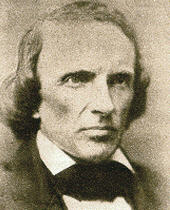William Henry Channing facts for kids
Quick facts for kids
William Henry Channing
|
|
|---|---|
 |
|
| Born | May 25, 1810 Boston, Massachusetts, U.S. |
| Died | December 23, 1884 (aged 74) London, England |
| Occupation |
|
| Language | English |
| Nationality | American |
| Alma mater | Harvard College, Harvard Divinity School |
William Henry Channing (born May 25, 1810 – died December 23, 1884) was an American clergyman, writer, and thinker. He was known for his work as a Unitarian minister. He also worked to improve society and supported women's rights.
Contents
Early Life and Education
William Henry Channing was born in Boston, Massachusetts. His father died when William was very young. His uncle, William Ellery Channing, helped raise him. His uncle was a famous Unitarian religious leader.
William went to Harvard College and graduated in 1829. He then studied at Harvard Divinity School, finishing in 1833. After his studies, he became a minister.
Working for Social Change
In 1835, Channing became a Unitarian minister in Cincinnati. He became very interested in ideas about how to make society better. He liked the ideas of people like Charles Fourier, who believed in creating fairer communities.
Channing later moved to Boston, then to Rochester, New York, and finally to New York City. In these cities, he became a leader in a movement called Christian socialism. This movement aimed to combine Christian values with ideas about social fairness.
He worked as an editor for magazines like The Present, The Spirit of the Age, and The Harbinger. These magazines shared ideas about social change. In 1848, he led a group in Boston called The Religious Union of Associationists. This group included people from the Brook Farm community, who were trying to build a new kind of society.
Supporting Women's Rights
William Henry Channing was an early supporter of the women's rights movement. He helped organize the first National Women's Rights Convention in 1850. He also attended this important meeting.
In 1852, he was a minister in Rochester. There, he met Susan B. Anthony, who was a young teacher at the time. Anthony later became a very famous leader for women's rights. She said that Channing's teachings helped her find her voice.
Channing also wrote the call for the Women's Rights Convention in Rochester in 1853. He played a big part in this event, which Susan B. Anthony organized. The convention started a campaign to ask for equal legal and voting rights for women. Channing wrote the petitions for this campaign. He even spoke to a committee of the New York Senate in 1854, along with Ernestine Rose.
Later Life and Writings
From 1854 to 1857, Channing served as a minister in Liverpool, England. He then took over from James Martineau as minister of the Hope Street Unitarian Chapel in Liverpool.
When the American Civil War began, he returned to the U.S. in 1862. He became the minister of a Unitarian church in Washington, D.C..
William Henry Channing was also a Transcendentalist. This was a group of thinkers who believed in the importance of nature and individual experience. He was friends with famous writers like Henry David Thoreau and Ralph Waldo Emerson. He wrote for important magazines such as North American Review and The Dial.
One of his most famous writings is called "Symphony." It shares his ideas about how to live a good life:
- To live content with small means; to seek elegance rather than luxury, and refinement rather than fashion; to be worthy, not respectable, and wealthy, not rich; to listen to stars and birds, babes and sages, with open heart; to study hard; to think quietly, act frankly, talk gently, await occasions, hurry never; in a word, to let the spiritual, unbidden and unconscious, grow up through the common — this is my symphony.
From 1863 to 1864, Channing served as the Chaplain of the United States House of Representatives. He passed away in London in 1884.
His Books
William Henry Channing wrote several important books, including:
- A translation of Jouffroy's Ethics (1840)
- Memoir of [his uncle] William Ellery Channing (1848)
- Memoir of [his cousin] the Rev. James H. Perkins (1851)
- Memoir of Margaret Fuller Ossoli (written with Emerson and J. F. Clarke) (1852)
Images for kids
 | Frances Mary Albrier |
 | Whitney Young |
 | Muhammad Ali |


